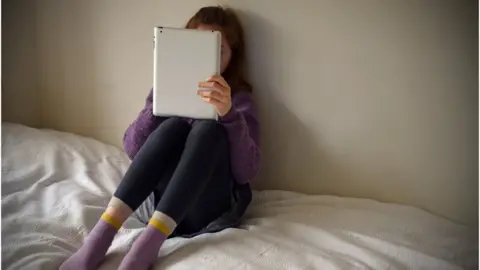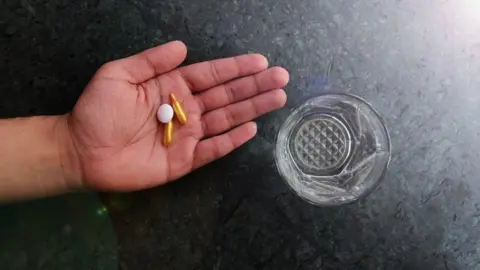'My autistic daughter was held in a cell for two years'
"They placed her in a seclusion cell and they left her there for two years, alone, 24/7, horrific."
Jeremy says he could only touch his 15-year-old daughter Bethany by kneeling down and reaching into her isolation room through a tiny hatch.
Bethany is severely autistic but had no therapeutic care while detained in hospital, Jeremy told the BBC.
Now MPs and peers say such treatment of young people with learning disabilities or autism breaches their human rights.
The Joint Committee on Human Rights says mental health hospitals can inflict "terrible suffering on those detained... causing anguish to their distraught families".
Its report urges an overhaul of mental health law and hospital inspections in England.
"It must not be allowed to continue," said Harriet Harman, who chairs the committee.
After a campaign by her parents, Bethany was briefly sent to an adolescent unit in Staffordshire which did "brilliant work", according to her dad.
"She was out in the community. She wasn't locked away. We could take the pet dogs, go for a walk in the grounds. It was brilliant."
But once she turned 18, she could no longer stay in an adolescent unit so she was transferred but not to a similar unit with similar support, says her dad.
"They placed her in an adult medium secure unit that doesn't even specialise in autism."
Bethany's form of autism means she experiences extreme anxiety and, without proper care, can be hard to manage, he told the Victoria Derbyshire programme.
He says she has "deteriorated massively. It's horrendous, She's in a cell again".
"I had a hatch before that I could hold her hand through. I don't even have that now. I can't hold my daughter."
 Getty Images
Getty ImagesBy law, young people with learning disabilities or autism detained in mental health hospitals must have treatment that is necessary, appropriate and available.
But the inquiry, launched in January, heard evidence of "a significant increase in distress and a worsening of symptoms for those detained, particularly where segregation and restraint have been used".
"We are concerned that a very broad approach has been taken to the 'appropriate medical treatment' requirement... and the approach appears to be that the most basic provision of care satisfies this test," the committee says.
"We consider the human rights of many of those with a learning disability and/or autism are being breached in mental health hospitals."
'Bone snapped'
One young man told the inquiry: "I did not know what was happening.
"Looking back at it now, it does not feel real. It feels like some sort of nightmare.
"It was not a safe place. It was not a treatment room. I got no assessment or treatment done.
"There was no care. I was just put in this room and I lay there and went to sleep."
Another had his arm broken in a restraint, according to his mother. "His arm was wrenched up behind his back until the bone snapped. He was not then taken to accident and emergency for 24 hours even though his arm was completely swollen," she said.
Another mother said her son had been kept in isolation for up to nine hours at a time.
"The rule was that he could not leave until he was quiet," she told the inquiry.
"With his anxiety and sensory presentation, there was no way this was possible.
"He started to bang his head against the wall and would bite the wood in the doorframe out of desperation."
Too often, families are excluded from decision-making and when they try to intervene are viewed as hostile and a problem, which is unacceptable, the report says.
Families must be recognised as "human-rights defenders", it says.
The committee says it has "lost confidence that the system is doing what it says it is doing", while the regulator, which should be a "bulwark" against abuses, is failing and in urgent need of reform.
"Too often it is left to the media to be human rights defenders," the report says, highlighting work by the BBC's Panorama programme in uncovering abuse of patients by staff at Whorlton Hall mental-health hospital.
'Stark clarity'
The MPs and peers also say they have no confidence government targets to reduce the number of people with learning disabilities or autism in mental-health hospitals will be met.
They demand:
- a special No 10 unit to safeguard the human rights of young people with learning disabilities and autism
- an overhaul of inspections, to include covert surveillance and unannounced visits at night and weekends
- only individuals who will benefit from treatment are detained in mental hospital
- families are fully involved in decisions
"This inquiry has shown with stark clarity the urgent change that is needed and we've set out simple proposals for exactly that," Ms Harman said.
"They must be driven forward urgently."
 Getty Images
Getty ImagesIan Trenholm, chief executive of the Care Quality Commission, which regulates health and social care services in England, said many of the report's recommendations relating to the watchdog were already under way, "although we are clear there is much still to be done".
Mr Trenholm said an independent review of the CQC's regulation of mental health hospitals had been commissioned and the findings would be used to strengthen this work.
"We know we need to improve how we regulate mental health, learning disability and/or autism services so we can get better at spotting poor care and at using the information people give us," he said.
"We are working hard to improve and we want to involve people, families, carers and stakeholder organisations to ensure we get it right."
